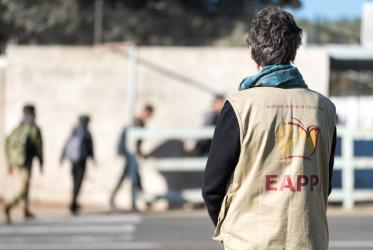The World Council of Churches (WCC) stands firm in viewing “antisemitism as irreconcilable with the profession and practice of the Christian faith”.
Already at the WCC’s founding Assembly in 1948, antisemitism was described as sin against God and humanity.
Since then, the WCC has a long history working for justice and peace for all people in the Middle East, not least in Palestine and Israel.
Sweeping allegations unfounded
“The WCC has long affirmed the right of the State of Israel to exist, within its internationally accepted borders,” explains WCC general secretary Rev. Dr Olav Fykse Tveit.
Seeing recent sweeping allegations claiming that the WCC – alongside Amnesty International and Human Rights Watch – “frequently stray into anti-Semitic territory”, Tveit adds that “We denounce categorically all violence and marginalization based on religion, ethnicity, race or any other dimension of a person’s identity or belonging.”
“What is problematic is the tendency among some groups to characterize legitimate criticism of Israeli government policies as being motivated by antisemitism," Tveit says.
In June 2019, the WCC convened jointly with the International Jewish Committee for Interreligious Consultations (IJCIC) under the theme of “The normalization of hatred: challenges for Jews and Christians today.” Tveit stressed the shared duty to see how all religious leaders and groups can counteract the normalization of hatred in physical and verbal forms, and that Christians and Jews should show their shared values in addressing this together.
During the June meeting, in response to appeals from IJCIC and others for WCC to adopt the International Holocaust Remembrance Alliance (IHRA) definition of antisemitism, WCC reiterated its position that it would “welcome a sufficiently precise and sufficiently widely accepted definition of antisemitism to clearly identify instances of condemnable hatred of Jews as Jews, while protecting legitimate criticism of the actions of individuals, groups or of the government of Israel from being falsely characterized as ‘antisemitic’”. However, “the IHRA definition is simply too vague”, and “fails in the essential purpose of a definition, to set bounds to one thing and to distinguish it from others. It fails to provide a basis on which legitimate, even if vociferous, criticism of specific policies and actions of the government of Israel can be distinguished from the ‘sin’ of antisemitism.”
WCC comment on IHRA definition of antisemitism (30 August 2018)
WCC leader reflects on antisemitism, definitions and future cooperation (WCC press release of 22 July 2019)
WCC general secretary reflects on renewed bonds with IJCIC (WCC press release of 12 July 2019)








